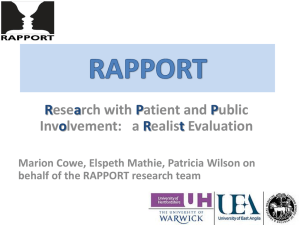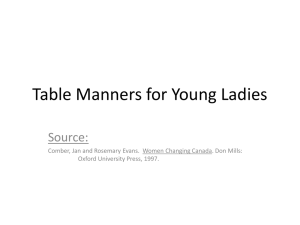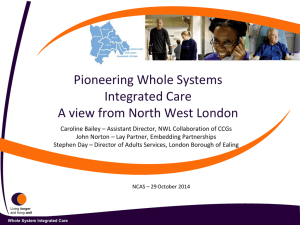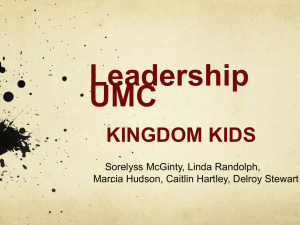Turning the world upside down
advertisement
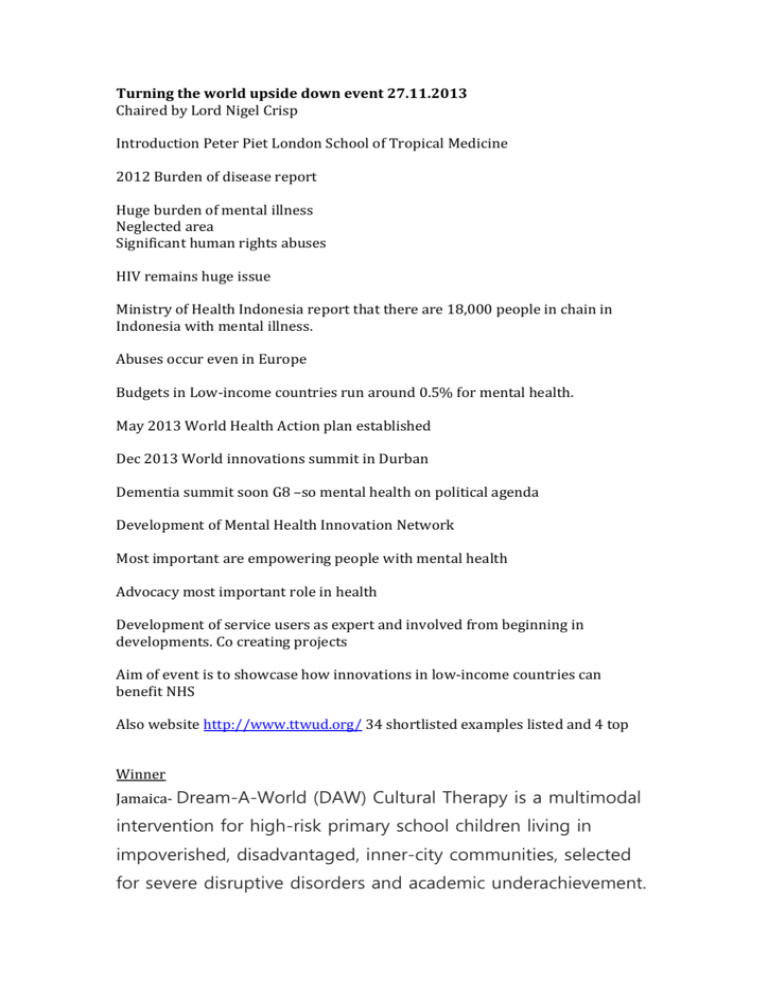
Turning the world upside down event 27.11.2013 Chaired by Lord Nigel Crisp Introduction Peter Piet London School of Tropical Medicine 2012 Burden of disease report Huge burden of mental illness Neglected area Significant human rights abuses HIV remains huge issue Ministry of Health Indonesia report that there are 18,000 people in chain in Indonesia with mental illness. Abuses occur even in Europe Budgets in Low-income countries run around 0.5% for mental health. May 2013 World Health Action plan established Dec 2013 World innovations summit in Durban Dementia summit soon G8 –so mental health on political agenda Development of Mental Health Innovation Network Most important are empowering people with mental health Advocacy most important role in health Development of service users as expert and involved from beginning in developments. Co creating projects Aim of event is to showcase how innovations in low-income countries can benefit NHS Also website http://www.ttwud.org/ 34 shortlisted examples listed and 4 top Winner Jamaica- Dream-A-World (DAW) Cultural Therapy is a multimodal intervention for high-risk primary school children living in impoverished, disadvantaged, inner-city communities, selected for severe disruptive disorders and academic underachievement. Frederick Hickling Considered 40% unhealthy in Jamaica Children lot of abuse and adversity High rate of teenage pregnancies, violence Primary mental health prevention programme Focus on children in schools under 8. Involves educational interventions and fantasy Presented at meeting Kerala- Using Mobile Telepsychiatry to Bridge the Mental Health Gap Providing telepsychiatry consultations onboard a bus by using low cost solutions such as free video conferencing software and wireless 3G for connectivity - Schizophrenia Research Foundation India - Feasible, effective and users confortable with technology - Low cost - Also train lay workers to support clinicians-case identification, referral and rehab - Redistributes resources - Secondary advantages e.g. employment But not for acutely unwell or for intense psychological interventions Can be applied to remote areas Presented at meeting BASIC NEEDS By placing affected people firmly at the centre of an economic and social approach to mental health, Basic Needs has had a significant impact in LMIC and is beginning to see what it can offer to the challenges faced by high income countries. Economic and social approach to mental health Component of -Livelihoods -Resources -Collaboration -Capacity building -Community mental health Arises out of poverty being associated with mental health difficulties Research and evaluation based on users of projects Are in 12 countries Benefited 589,000 people since 2000 -Increased access to treatment -Improved family and quality of life -Improved work opportunities -Reduction of symptoms Key is use of user and self help groups Advocacy comes from users and policy makers 20,000 in 628 peer self-help groups 90,000 reentered workforce -People at centre - Proven model -Community orientated - Maximize resource use and task shifting -Self help groups hold power and sustainability Model is same in each country but local adaptations Starts with initial capacity building meeting Largest in this specialized are Budget of 2.3 million turnover per year Presented at meeting GOA SUNDAR: mental health for all by all SUNDAR describes the ingredients of Sangath’s approach to improve access to evidence based interventions for mental health problems through lay people as the front line mental health care providers. -3,500 psychiatrists in India MANAS trial showed can use lay health counselors effectively for treatment of depression and anxiety. Improves reduction of suicide Home care for Schizophrenia Lay workers for dementia Lay counselors in school Autism care -Simplify language -Unpack treatments -Deliver where people are -Affordable -Quality human resources -Specialists take on training and supervision role -Importance of evidence and needs based -Deliver through existing systems and support of government – sustainability Lay workers are paid and supervised No peer workers yet Now 3 mental health workers in every primary care centre in India The following are other entrants which are on website in more detail - Brazil's 250,000 lay Community Health Workers, each with responsibility for up to 150 households, lead to remarkable impact on individual and population health - Jamaica-Admissions of the acutely mentally ill to open wards of general medical hospitals have had a profound impact on the assimilation of psychiatry into general medical practice. - Jamaica-Mental Health Officers have served as the ‘glue’ holding together all the elements of community mental health integration in Jamaica over 50 years - Jamaica - Psychiatry’s traditional geographic separation from medicine has been significantly challenged by the integration of culturally appropriate affordable mental health care into Jamaica’s public health system, accessible to the entire population. - Jamaica- Independence from British colonialism catalyzed the gradual deinstitutionalization process of the century old custodial Lunatic Asylum leading to an 80% gradual decline in the resident population over 5 decades. - Haiti- A community-based outreach program in mental wellness was organized among local volunteers and children at an earthquake field hospital in Leogane, Haiti; January 2010. - Saint Vincent We have piloted self-help groups in Saint Vincent/Grenadines as a cost-effective way to address alcohol problems and have learned that, contrary to Western models, they need not and should not be anonymous to succeed. - UK –Southwest London - Co Producing Mental Health and Well Being Early Intervention and Prevention in Black Communities: unlocking social capital to add public value - Jamaica- Introducing a Community Mental Health Team in the Public Health primary and secondary service of the Kingston Metropolitan area portends an impending Mental Hospital deinstitutional end game metamorphosis - Uganda - The Aim of the Partnership is to enable sustainable improvements in mental health services and support in the Statutory and Voluntary Sector in both Gulu and Sheffield. - South America - We are a voluntary organisation established in 2012 seeking to improve mental health care by collaborating with mental health services and related organisations in Latin America and Europe. - Greece- Event in a busy metro concourse to encourage citizens to change their perception of mental health problems: also to offer people with psychosocial difficulties and their families free support - Nigeria- A mental health service within the Juvenile Justice System, sustained by partnerships and existing programmes is an initiative of a multidisciplinary Child Mental Health Team in the University of Ibadan. - Zimbabwe- HIV positive teenagers from Zimbabwe have developed their own books, films, photos, music and art as therapeutic interventions for themselves and their HIV positive peers around the world - Kerala- An awareness cum screening project conducted among school children in Attappady,the largest tribal block in Kerala State Of India ,aimed at detection,prevention and remedial measures regarding substance abuse. - Chile- National roll-out of a collaborative care model for depression in Chile, integrating detection and treatment of depression into primary care. - Ghana - Through the network of self-help groups surrounding Sandema in northern Ghana, members challenge discrimination, share support and advice, and attain financial security in a very poor setting. - Kerala- Delirium is a syndrome characterized by the acute onset of fluctuating cognition, inattention and disturbed consciousness. We are reporting a very cost effective Indian Indigenous way of treating Delirium. - Ghana- We tested the evidence that creative arts can facilitate mental health promotion by organising a public exhibition of artwork produced by mentally ill individuals, artists and researchers, in Accra, Ghana. - South Africa - The PMHP envisions integration of mental health care for pregnant and perinatal women at primary level. Four inter-related programmes aim towards scale up: service delivery, training, research and advocacy. - Ghana-Involving patient’s family in the care of the patient has proved very useful because it seeks to eradicate the stigma attached to mental illness. - Indonesia - Integrating mental health in a national health survey has made mental health studies become more readily acceptable. The impact is that the survey can be run continuously. - Pakistan- SHARE-THPP equips lay women (i.e. peer volunteers) to deliver evidence-based psychological treatment to mothers in their communities, in order to reduce the burden of maternal depression in Goa, India and Rawalpindi, Pakistan. - Canada-India- Canadian Mental Health Centre develops Parent Education Resource shared in International Partnership with Indian NGO which adapts, universalizes resource removing limitations of a standardized kit, shared back with Canada . - Andes region- A study of the genetics of movement disorders amongst unmedicated Kolla indgenous people in the Andes mountains opens the door for prediction of risk and primary prevention of schizophrenia. - Uganda- The Butabika Link- East London NHS Foundation Trust in consultation with The Uganda Diaspora health Foundation, has managed to successfully plan and develop health projects in Uganda. - Uganda -UK and Ugandan mental health service users met in 2008 leading eventually to a user led organisation and innovative solutions to the lack of resources.
